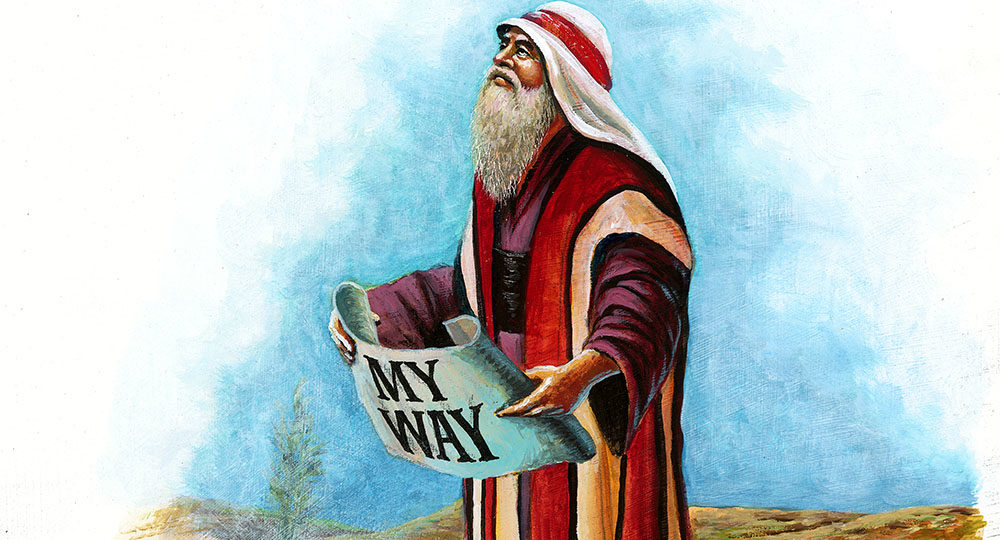I’ll Do It My Way, Lord!
The very mention of the name Abraham causes multitudes of people to perk up their ears. Muslims, Jews, and Christians alike look to this patriarch as the founder of their religion. Abraham was a great man of faith (Gen. 15:6). He followed the call of the Lord from Ur of the Chaldeans to the land that was promised to him and his seed. However, he insisted on getting there his own way. Apparently he had a difficult time leaving his family. He wanted to obey God, but in his own way and time.
It is easy for us to become self-centered and want to do things our own way. It is not easy for us to do things the way others want them done. This attitude often causes personal struggle and sometimes even conflict among people in the best of churches. Sad to say, it seems easier to try to accomplish things our own way rather than God’s way. Such was the case with Abraham. This article examines four incidents of doing it my way in the patriarch’s life.
Abram Stayed in Haran
When the Lord first called this forefather of Israel from Ur of the Chaldeans, he was told “to go into the land of Canaan” (Gen. 11:31). Although a cursory reading of that verse may give the impression that Terah, Abram’s father, led the way, that was not the case. According to Genesis 12:1, God called Abram to go to the Promised Land, a fact made very clear in Stephen’s address to the Sanhedrin recorded in Acts 7:1–2. Respect was shown to Terah in Genesis 11:31 because he was older; however, Abram was the one whom the Lord called.
Instead of following the Lord’s direction and going to Canaan, the patriarchal family made an extended stop in Haran. The Bible doesn’t record that they sojourned there but that they dwelt there. The word dwell has the concept of taking up permanent residence. This family was doing it their way rather than God’s way; therefore, the Lord stepped in. His plans would not be thwarted. God removed Terah from the scene through the avenue of death, and Abram and his family finally “departed, as the Lᴏʀᴅ had spoken unto him” (Gen. 12:4).
It is easy for us, nearly four thousand years later, to stop just when the Lord is moving and blessing us. At times He may have to take some dramatic steps to get us going again. We should remember Haran and never allow ourselves to get bogged down for any reason when the Lord calls. Nor should we allow family members to divert us from doing God’s will.
Abram Strayed Into Egypt
Clearly, the Scriptures show that the Lord’s intended destination for Abram and his family was Canaan, and after a long journey, “into the land of Canaan they came” (12:5). As Abram moved through the land, God again promised to give it to him, and then He enlarged the promise to include his seed. God had been so good to Abram that he stopped and built an altar to the Lord, calling on His name and worshiping Him there.
Apparently, as Abram continued his journey south, famine hit the area, and there was no food for his family or herds. God allowed this to occur to test the faith of the patriarch. Instead of trusting the Lord to provide, he decided to take matters into his own hands once again. And again, trouble lay ahead.
Egypt looked good. The Nile always flooded, and in that lush, green delta there would be plenty of food. But Abram had another major problem—his wife Sarai. She was beautiful and would be desired by the Egyptian men. Abram feared that they would do away with him in order to have her. And so, Abram again did it his own way. Instead of telling the Egyptians that Sarai was his wife, he said she was his sister. She must have been extremely beautiful, for word quickly reached Pharaoh’s house about this woman who was the epitome of feminine comeliness.
Although Pharaoh treated Abram well because of Sarai, his household was stricken with serious plagues because of her. Abram’s scheme was exposed, and the leader of Egypt expelled the patriarch and his wife.
Again, going ahead of the Lord led to trouble. Were it not for the Lord, Abram would have died. His desire to do things his own way backfired, and he had no choice but to flee to Bethel, where he had previously erected an altar to the Lord. Human effort had failed once again. It always does.
It is easy to plan and scheme to get our own way. We plot and design, stand up for our rights, but do not please the Lord. And we usually make enemies in the process. Many churches have split because of a few people who wanted their own way.
Abram Was Stalled by Lot
Families are wonderful! They love each other and provide a feeling of being wanted and secure. However, there are times when families hold us back. Many quality missionary-type people have been hindered from serving the Lord by their families. This is exactly what happened to Abram. He was stalled and kept from doing the perfect will of the Lord because of the encumbrance of Lot and the rest of the family.
God had blessed Abram, and he became a very wealthy man. Lot too had been blessed abundantly by the Lord in a material way. “And Lot also, who went with Abram, had flocks, and herds, and tents. And the land was not able to bear them, that they might dwell together; for their substance was great, so that they could not dwell together” (Gen. 13:5–6).
It is amazing how God works. Abram had not separated from his family, as the Lord had commanded (12:1). So the Lord again took care of the problem. He blessed both Abram and Lot so greatly that they had to separate themselves because of strife that developed between their respective herdsmen (13:7).
Abram graciously suggested to Lot that they try to remedy the situation concerning the herdsmen and flocks. “Is not the whole land before thee? Separate thyself, I pray thee, from me: if thou wilt take the left hand, then I will go to the right; or if thou depart to the right hand, then I will go to the left” (13:9). Take what you want! Abram offered.
Lot selfishly chose the plain of Jordan, which was beautiful and lush. But, sad to say, Sodom and Gomorrah were there, and in time Lot and his family were pulled into a compromising position, to say the least. They grew closer and closer to Sodom’s wickedness. Abram rescued Lot once, but in the end—before God destroyed that wicked city—only Lot and two of his daughters were spared.
Abram did not leave his kinsmen back in Ur. He dragged them along. Instead of doing what the Lord had commanded, he did it his way. But his way led to the spiritual downfall of his family and their destruction at Sodom. It even cost Lot his wife.
If our plans are not in the will of God, no matter how good they may seem, they will cause heartache, despair, and even spiritual destruction. How different it might have been if Abram had fully obeyed God and left his kindred. We must learn to be totally obedient to the Lord. Experiencing God’s blessing requires obedience as well as faith.
Abram Sought a Son
Children! They can be a blessing from God! They can also cause all kinds of problems, heartaches, worry, and concern. Most couples desire children, and some go to great lengths and expense to either bear a child naturally or adopt one. The Word of God says, “be ye fruitful, and multiply; bring forth abundantly in the earth, and multiply therein” (Gen. 9:7). This command, which was originally given to Adam in Genesis 1:28 and was reiterated in the above verse, is one of the few commands of God that man has obeyed.
Abram wanted an heir—a son. He felt so strongly about it that he said, “Lord GOD, what wilt thou give me, seeing I go childless, and the heir of my house is this Eliezer of Damascus? And Abram said, Behold, to me thou hast given no seed: and, lo, one born in my house is mine heir. And, behold, the word of the LORD came unto him, saying, This shall not be thine heir; but he that shall come forth out of thine own loins shall be thine heir” (Gen. 15:2–4).
So, Abram would have a child naturally. But he was getting old, and his wife was barren. Again, he couldn’t wait. I’ve got a plan. I’ll do it my way! Sarai made the suggestion. Why not take Hagar, her maid, and have a child by her. Being anxious for an heir, Abram refused to wait on the Lord and followed the foolish advice of his wife.
As the result of this unblessed union, a child—Ishmael—was born. But again, this one was not to be the child of God’s promise, although Ishmael was certainly a legitimate heir. Abram again took the matter into his own hands and did it his own way, only to cause problems—major problems, problems that still plague his descendants today, nearly four thousand years later.
Finally, when Abram was 99 and Sarai had reached the ripe old age of 90, and after Abram had tried it his way, God gave them a natural, miracle son—Isaac. The Lord made them wait many years, but He finally came through.
The Bible truly shows the weakness of man. Abraham was a man of great faith: “And he believed in the LORD; and he counted it to him for righteousness” (Gen. 15:6). The hall of heroes of the faith of Hebrews 11 gives him high honors as it speaks of his faith. He is near the top of the list of men of faith in the Scriptures, but, like us, he too had weaknesses and flaws.
We would do well to note the weaknesses of this great Bible character. It is so easy to get caught in the same trap of rushing into things and doing them our own way in our own strength. We must learn from Abraham, as well as others, to wait on the Lord for His way and His timing. We would save ourselves many headaches and heartaches. After all, His way is best.
Lest you feel that this author is being too critical of the patriarch, I remind you that Abraham’s faith and dependence on the Lord continued to grow. He learned to trust the Lord so much through the experiences of his life that when he was commanded by God to offer his son Isaac as a sacrifice, he was willing to do so, believing that God would raise the lad from the dead.
The normal processes of life teach us to do things our own way, but when we do, it is never long before we get into trouble. As the Lord works in our lives, we should, like Abraham, realize that our way does not work. As we mature in the faith, the Lord will change us by His Spirit. Then we will come to the place where, like the patriarch and our Lord Himself, we can say, “nevertheless, not my will, but thine, be done” (Lk. 22:42). Let us pray for the grace of God to so work in our lives.








